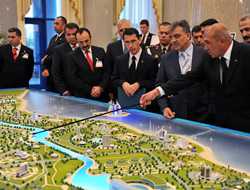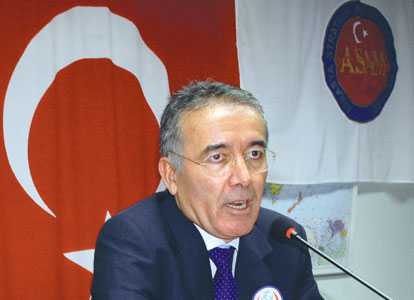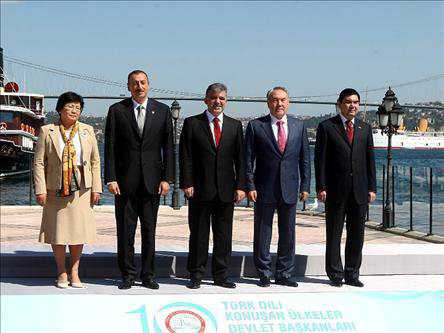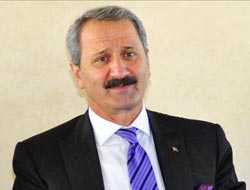Turkey Bolsters Ties With Turkic States Turkey Bolsters Ties With Turkic States
Publication: Eurasia Daily Monitor Volume: 7 Issue: 170
September 22, 2010
By Saban Kardas
Turkey hosted the tenth summit of Turkic-speaking countries in Istanbul on September 16. The Istanbul summit, bringing together Turkish, Kazakh, Azeri, Kyrgyz and Turkmen leaders, took steps towards furthering institutionalizing this inter-governmental platform, in line with the conclusions of the previous meeting in Nakhchivan in October 2009. Through the Nakhchivan declaration, Turkey, Azerbaijan, Kazakhstan and Kyrgyzstan had formed a Turkic-Speaking Countries Cooperation Council –or Turkish Council, as Turkey seeks to promote it. In Istanbul, the leaders agreed to implement measures to make the new bodies operational, including the Council of Heads of State, Council of Foreign Ministers, Council of Senior Foreign Ministry Officials, Wise Men’s Council and Permanent Secretariat. Moreover, they agreed to set up other institutions to protect joint cultural heritage, form a union of universities, and create a fund to support research activities (Anadolu Ajansi, September 16; for an English text of the final declaration, see: Today’s Zaman, September 17).
Turkish President, Abdullah Gul, the host of the summit, emphasized the importance of the meeting to strengthen the commonalities among the brotherly nations in terms of language, history, religion and cultural values. He called upon the leaders to diversify relations in various areas. The leaders attending the summit highlighted the role of this burgeoning cooperation in contributing to peace and pledged to deepen solidarity to boost regional stability, human rights and a market economy.
The conclusions of the meeting reflect the Turkish government’s desire to play a greater leadership role in the Turkish speaking world. Although Ankara sought to forge closer ties among these states in the early post-Cold War period, it failed to realize this ambitious objective. However, in recent years, the Turkish government has demonstrated its willingness to revitalize cooperation among Turkic countries. The recent decisions are, thus, products of Ankara’s determined moves in that direction (EDM, November 23, 2008). After the Nakhchivan declaration was passed last year, Gul presented it as a major success on Turkey’s part (www.euractiv.com.tr, October 6, 2009). Turkey expects the Turkish Council to develop based on the model of other similar organizations, such as the Commonwealth, Arab League or Francophonie (www.tcbb.gov.tr, September 16). Nonetheless, in an example of the limitations before this objective the Kazakh, Turkmen and Kyrgyz leaders spoke at times in Russian during the summit (Dogan Haber Ajansi, September 16).
In a move that underscored Turkey’s leadership role, the first rotating presidency was assumed by Turkey and a senior Turkish diplomat, Halil Akinci, former ambassador to Moscow, was appointed as the Secretary-General of the council (Zaman, September 16). So far, there have been irregular summits as well as bilateral meetings between different states. Ankara believes the establishment of a permanent secretariat in Istanbul would increase the visibility of the council in regional and international affairs and contribute to the institutionalization of governmental ties.
Speaking at the summit, Gul went as far as maintaining that “from now on, we are one nation, but six states.” The phrase “one nation, two states,” has been used to define the warm ties between Turkey and Azerbaijan. It remains to be seen if other Turkic states will embrace it to the same extent to identify themselves so closely with Turkey. Ankara has been unable to convince all Turkic states to participate. Uzbekistan has deliberately avoided attending the summits since the early 2000’s. Turkmenistan has also been aloof to this platform for some time. In that sense, Turkmenistan’s representation at the Istanbul summit can be considered as a positive step. Nonetheless, referring to its foreign policy principle of “positive neutrality,” Turkmenistan did not sign the Nakhchivan declaration. Uzbekistan again was absent from the Istanbul summit, underscoring continuing divisions.
Besides its importance for intra-Turkic cooperation, the Istanbul summit also provided a venue for the participating leaders to hold various bilateral meetings with their counterparts to discuss issues of specific relevance. Turkey, for its part, used that opportunity to deepen ties with Azerbaijan. On the margins of the summit, Turkish Prime Minister, Recep Tayyip Erdogan, and Azeri President, Ilham Aliyev, signed a framework agreement to form the High Level Strategic Cooperation Council (Hurriyet, September 15). Ankara has signed similar agreements with several countries, mainly its Middle Eastern neighbors. The agreement with Baku was in preparation for some time, and its conclusion further highlights Ankara repairing its ties with Azerbaijan following the row caused by the Turkish-Armenian normalization process.
Moreover, the energy ministers from Turkey, Azerbaijan and Turkmenistan discussed energy cooperation. Ankara already has an agreement to purchase Turkmen gas, provided that transit problems are resolved. Thus, Turkey wants to contribute to the resolution of the disputes between Azerbaijan and Turkmenistan, for it would also deepen cooperation as part of the East-West energy corridor and enable the export of Turkmen gas to Europe through Turkey. Turkish Energy Minister, Taner Yildiz, noted that they avoided discussing the status of the Caspian Sea, especially border issues. He stressed that it could still be possible to develop trilateral cooperation in some undisputed sectors of the Caspian even before other major issues were resolved. Azeri Energy Minister, Natiq Aliyev, also expressed hope that the remaining disagreements could be resolved so that Turkmen gas could be exported through the Caspian and Azerbaijan. The Turkish side welcomed this meeting as a positive step, which might boost prospects for the Nabucco pipeline (Anadolu Ajansi, September 15).
For some time, the Turkish government has been criticized for its neglect of Central Asia in its foreign policy priorities (EDM, June 25). In contrast, the government has presented its recent steps in the South Caucasus and Central Asia as proof that it has been pursuing a multidimensional foreign policy. Therefore, Ankara widely publicized the Istanbul summit as a great success. Nonetheless, those skeptical of the government urge caution and argue that one should wait to see if the declaration will be matched with deeds before judging the success of the government’s recent initiatives within the Turkic world (www.211yyte.org, September 17).
https://jamestown.org/program/turkey-bolsters-ties-with-turkic-states/
 The Turkish president said on Friday that his current visit to Turkmenistan confirmed one more time the will and determination to improve Turkey’s ties with this country.
The Turkish president said on Friday that his current visit to Turkmenistan confirmed one more time the will and determination to improve Turkey’s ties with this country.




